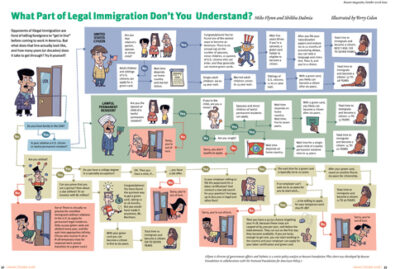Due Process and the Courts
What does the constitution say about due process?
The Fifth Amendment to the Constitution says clearly that no person shall be deprived of life, liberty, or property without the due process of law. Note that this says person, not citizen, and over the years the Supreme Court has consistently ruled that the Due Process Clause applies to all people in the United States.Do non-citizens have the right to due process in the U.S.?
Yes. The Constitution guarantees due process rights to all "persons," not just citizens. This means non-citizens, including undocumented immigrants, are entitled to fair treatment under the law. This includes the right to defend themselves in court. But recent Trump administration policies that speed up deportations and limit access to legal representation make it harder for non-citizens to get their fair day in court.- Access to legal representation Access to legal counsel is an essential part of our justice system and our democracy. In the criminal justice system, anyone facing even one day in jail gets a lawyer if they can't afford one. But immigrants facing deportation usually don't get that chance.The research is clear – the most effective way to ensure some level of due process for people navigating our complicated immigration system is for them to have trained attorney at their side. But Trump administration is now working to strip attorneys from as many people as possible, all in the name of increasing its deportation numbers. This attempt to eliminate basic due process will hurt people who already have few options.
- Fair day in court Due process guarantees that individuals have the opportunity to defend themselves in court. This includes non-citizens facing deportation.
Why is due process important?
We are seeing right now the importance of due process when it comes to President Trump's actions to carry out the so-called Alien Enemies Act, a 1798 wartime law that permits people to be deported outside of the normal framework of immigration law. President Trump has alleged that this law allows him to simply point at any person, declare them to be an alien enemy, and kick them out of the country without ever having a chance to see a judge. Thankfully, the Supreme Court said that is not true, and in a unanimous decision, ruled that people can challenge the Trump administration's invocation of the Alien Enemies Act. That is why due process is so important, because it means that no person can be rounded up and sent to another country without a chance to go to court and make the government prove their case.How is the American Immigration Council working to protect due process?
- We serve thousands of individuals in immigration detention centers through the Immigration Justice Campaign, our initiative with the American Immigration Lawyers Association. The Justice Campaign provides free legal services for immigrants who would otherwise have to navigate our complicated immigration system without a lawyer.
- We use the courts to demand a fair process for immigrants. Our litigation team is fighting back against the Trump administration’s blatant disregard for due process including filing a lawsuit challenging their illegal detention of immigrants in El Salvador’s notorious Terrorism Confinement Center (CECOT).

Supreme Court Hears Immigration Case Asserting Discrimination Against Unmarried American Fathers
Last week, the Supreme Court heard arguments in Lynch v. Morales-Santana, a case that will decide whether the U.S. Immigration and Nationality Act (INA) unlawfully favors mothers over fathers of children born out-of-wedlock when granting citizenship to their children born abroad. In determining whether a U.S. citizen parent may transfer… Read More

How the Immigration Court Backlog Would Skyrocket Under Donald Trump’s Plan
For more than a decade, the immigration court system has struggled with an enormous backlog. The latest figures from (TRAC) record the backlog at an all-time high of 521,676 as of the end of October, the first month in Fiscal Year (FY) 2017. The data release coincides with… Read More

Challenging Obstacles to Meeting The One Year Filing Deadline for Filing An Asylum Application
This lawsuit challenged obstacles faced by asylum-seekers in satisfying the statutory requirement that they apply for asylum within one year of entering the United States. Read More

Immigration Groups File Briefs Calling For End to Detention Without Bond
Although the U.S. Constitution provides citizens and noncitizens the right to seek bail after an arrest, immigration detention is different. Certain noncitizens who are arrested by immigration authorities may be detained for months on end, while awaiting hearings that will determine whether they can remain in the United States. Many… Read More

Access to Counsel Before USCIS FOIA
The Council filed a lawsuit against the Department of Homeland Security (DHS) to compel the release of records relating to noncitizens’ access to counsel before United States Citizenship and Immigration Services (USCIS). In response to the suit against USCIS, the agency determined that it had over 2000 pages of responsive… Read More

Access to Counsel Before ICE FOIA
The Council filed a lawsuit against the Department of Homeland Security (DHS) to compel the release of records relating to noncitizens’ access to counsel before Immigration and Customs Enforement (ICE). The Council initially pursued disclosure of these records through FOIA requests filed in March 2011. Subsequently, ICE produced several thousand… Read More

Federal Court Strikes Down Immigration Detainers
In a decision late last week, the federal district court in the Northern District of Illinois invalidated the practice of issuing immigration detainers by U.S. Immigration and Customs Enforcement (ICE). The court found that detainers violate federal law because they exceed the government’s warrantless arrest authority and made it… Read More

Groups Settle Lawsuit Challenging Failure of U.S. Customs and Border Protection to Timely Respond to FOIA Requests
In accordance with a settlement reached by the parties, a federal district court dismissed a class action lawsuit which challenged U.S. Customs and Border Protection’s (CBP) nationwide practice of failing to timely respond to requests for case information under the Freedom of Information Act (FOIA). Read More

Supreme Court Won’t Rehear Executive Action on Immigration — What’s Next?
This week, the United States Supreme Court declined to rehear arguments in United States v Texas, the case challenging expanded Deferred Action for Childhood Arrivals (DACA) and Deferred Action for Parents of Americans and Lawful Permanent Residents (DAPA). This means that the Fifth Circuit’s decision upholding the district court’s… Read More

Ninth Circuit Finds Court Has No Authority to Hear Lawsuit Seeking Access to Counsel for Children
In 2014, a legal challenge was mounted against the federal government for its failure to provide legal representation to indigent children in deportation proceedings. The case, F.L.B.. v. Lynch was brought by the American Immigration Council, American Civil Liberties Union, the Northwest Immigrant Rights Project, Public Counsel, and K&L… Read More
Make a contribution
Make a direct impact on the lives of immigrants.
